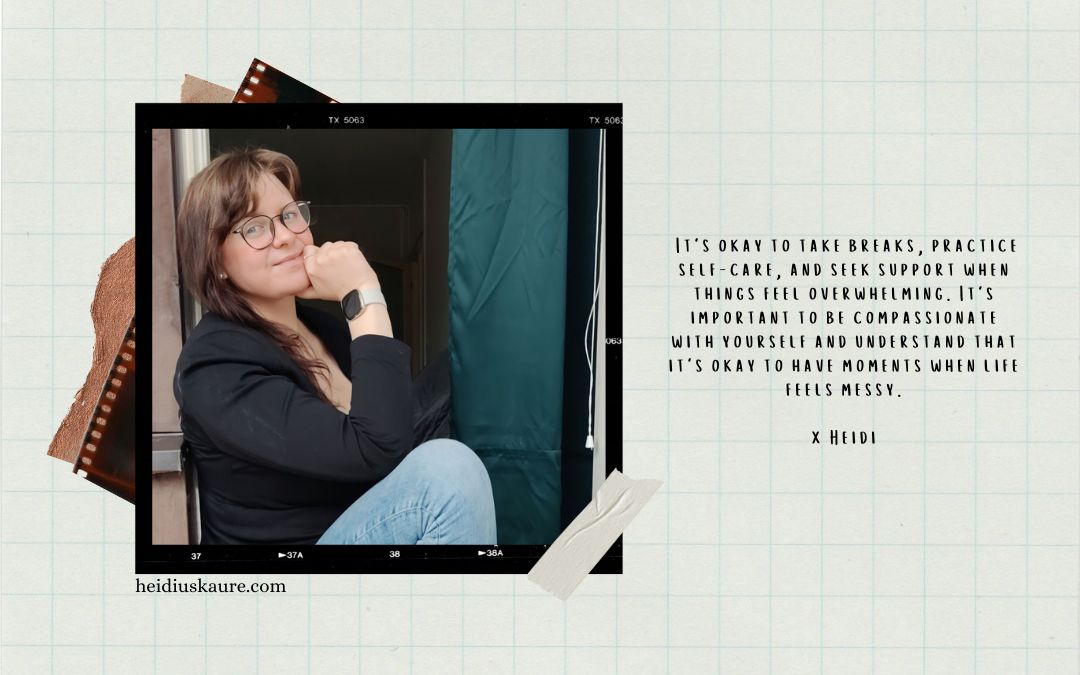Last year as I was going through my divorce, my emotions were all over the place, and it was like trying to keep a bunch of squirrels in a cage. One year has elapsed since I last closed the door to my x residence. I was like a faulty light switch, flickering on and off faster than you can say “emotional whiplash.” I’m sure many people who have gone through a very messy break-up can relate. And if you haven’t, congrats on being a rare unicorn in the dating world. Keep on sparkling, my friend. I realized that emotions have the power to drain my energy. But instead of letting them defeat me, I sit with them. Acknowledging and confronting my emotions, I found the strength to overcome any obstacle. Remember, the only way to move forward is to face what’s holding you back.
Curled up in my bedroom, I can’t help but notice the scattered objects that haven’t entirely found their place in my new home yet. Despite the sense of uncertainty of this new beginning, the feeling of excitement stirs within me. Isn’t it funny how anything new or unknown can make you feel this way? I recently moved my office back home and transformed my living room into a bedroom and workspace. Now, I’ve got my sights set on these intriguing hanging chairs to enjoy the sun on the balcony for my daughter and me. Something about this change makes me feel like I’m on the brink of an adventure, gazing out at the horizon with curiosity.

I took the opportunity to volunteer with MIELI Mental Health Finland to engage in online conversations with young individuals. I have encountered various topics, including school bullying and frequent parental conflict at home. My primary volunteer activity involves providing virtual companionship and moral support to individuals in need via online chat. This includes typing out words of encouragement and offering unwavering emotional support from the comfort of my own home. There seems to be something about the veil of anonymity that encourages greater openness and honesty with the anonymous young people I have been chatting with. Have you ever volunteered before?
“Highly sensitive people are too often perceived as weaklings or damaged goods. To feel intensely is not a symptom of weakness, it is the trademark of the truly alive and compassionate. It is not the empath who is broken, it is society that has become dysfunctional and emotionally disabled. There is no shame in expressing your authentic feelings. Those who are at times described as being a ‘hot mess’ or having ‘too many issues’ are the very fabric of what keeps the dream alive for a more caring, humane world. Never be ashamed to let your tears shine a light in this world.”
― Anthon St. Maarten
I have read quite a bit about emotions, and I find the subject intriguing. Emotional Intelligence, often referred to as EQ, encompasses the ability to understand and manage one’s emotions and recognize and influence those around you. In today’s fast-paced and interconnected world, emotional intelligence has become essential for navigating relationships and managing stress. Simply put, emotional intelligence helps people identify their emotions and understand their behaviours.
How can I start practising self-awareness?
Emotional intelligence starts with self-awareness, the ability to recognize and understand one’s emotions, thoughts, and behaviours. It involves being in tune with your emotional state and being able to accurately identify and label your emotions, whether they are positive, negative, or somewhere in between. Self-awareness also includes understanding your strengths, weaknesses, and triggers, as well as being able to assess your abilities and limitations objectively.
Self-management is another crucial component of emotional intelligence. It involves the ability to regulate and manage your own emotions effectively. This means controlling impulsive reactions, managing stress, and adapting to changing situations. Self-management also includes the ability to set and work towards goals, persevere in facing challenges, and demonstrate resilience in difficult situations.
Recognizing and understanding the emotions of others is known as social awareness. It involves empathy – the ability to understand and relate to the emotions and perspectives of others. Social awareness also includes accurately perceiving and interpreting nonverbal cues, such as body language and facial expressions, to understand how others are feeling.
Influence and relationship management are critical components of emotional intelligence as well. Being able to effectively communicate and interact with others, build and maintain positive relationships, and influence the emotions and behaviours of others positively is crucial in personal and professional settings. This includes effective communication, active listening, conflict resolution, and teamwork.
What are the benefits of EQ?
The benefits of emotional intelligence are numerous and far-reaching. Research has shown that individuals with high emotional intelligence tend to have better mental health, higher job satisfaction, and more career success. They are also more likely to have healthy relationships, better interpersonal skills, and increased resilience in facing challenges. In addition, emotional intelligence has been linked to better decision-making, improved leadership skills, and greater overall well-being. Developing emotional intelligence is a lifelong process that can be cultivated and improved over time.
Here are some strategies to help enhance your emotional intelligence:
- Practice self-reflection: Take the time to reflect on your emotions, thoughts, and behaviours. Pay attention to your triggers and patterns of behaviour. Ask yourself why you feel the way you do and how it might impact your actions.
- Enhance self-awareness: Become more aware of your emotions and how they influence your behaviour. Label your emotions and acknowledge them without judgment. Understand your strengths, weaknesses, and areas for improvement.
- Learn to regulate your emotions: Develop strategies to manage your emotions effectively. This may include techniques such as deep breathing, mindfulness, or seeking support from others. Find healthy ways to cope with stress and difficult emotions.
- Cultivate empathy: Practice putting yourself in the shoes of others and try to understand their emotions and perspectives. Listen actively to others and show compassion towards their feelings and experiences.
- Improve communication skills: Develop practical communication skills, both verbal and nonverbal. Learn to express yourself clearly and respectfully, and practice active listening to understand others truly.
- Build positive relationships: Foster healthy relationships with others by building trust, maintaining open communication, and resolving conflicts constructively. Develop teamwork and collaboration skills.
- Develop emotional resilience: Learn to bounce back from setbacks and challenges. Cultivate a positive outlook and develop coping strategies to overcome obstacles.
If this topic got you interested, I highly suggest checking out these books:
- “The Book of Human Emotions: An Encyclopedia of Feeling from Anger to Wanderlust” by Tiffany Watt Smith – This unique book explores the complexity and diversity of human emotions. It provides insights into emotions’ cultural, historical, and psychological aspects, offering readers a deeper understanding of the human emotional experience.
- “The Highly Sensitive Person: How to Thrive When the World Overwhelms You” by Elaine N. Aron – This book focuses on emotional intelligence from the perspective of highly sensitive individuals who are more sensitive to sensory and emotional stimuli. It provides insights, strategies, and coping mechanisms for managing emotions and thriving in a world that can be overwhelming for sensitive individuals.
Here’s a link to test your EQ.
Alright, let me summarize it down for you in a language we all understand (and love): being emotionally intelligent is like hitting the jackpot of life. It means you’ll be happier, more fulfilled, and better at pretty much everything you do. We’re talking about mental health, job satisfaction, relationships, decision-making, leadership skills, and being a badass overall. So, how do you get there? Well, it’s all about knowing yourself, regulating your emotions, being empathetic, and communicating like a boss. And the best part? Once you’ve got this skill down, you’ll be able to hang out with yourself and actually enjoy it. Woohoo, the party of one!
Be kind & don’t go changing,
x Heidi




0 Comments